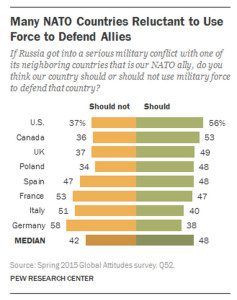A recent Pew poll says that they are. According to Pew, “at least half of Germans, French and Italians say their country should not use military force to defend a NATO ally if attacked by Russia.” Indeed, the news is grim. The public release informs us that, “Americans and Canadians are the only publics where more than half think their country should use military action if Russia attacks a fellow NATO member (56% and 53%, respectively). Germans (58%) are the most likely to say their country should not.”
Clearly, Pew thinks this is a big deal. How do we know? They provided a one-click solution for anyone wanting to publicize the finding on Twitter: “Germans (58%) most likely to say their country should not defend NATO allies against Russian military conflict https://pewrsr.ch/Rus-Ukr2015”
That certainly sounds distressing. Is it true?
Unfortunately, we can’t tell. Because that’s not the question Pew asked.
Pew’s question fails to specify whether Russia or its NATO neighbor initiated the conflict. I checked the questionnaire (PDF), and the wording is the same as the graphic and not the text of the report:
This matters. Article V only obligates NATO members to intervene in response to aggression against another member state. It does not require signatories to come to the assistance of NATO members that initiate conflicts. In other words, Article V is a collective-defense provision, not a collective-entrapment one.
Now, I think it entirely possible that a large number of those polled would answer similarly if asked the question that Pew, and the rest of the world, cares about. But we can’t know that. Any number of factors might systematically influence how respondents interpreted the question in different countries.
This is really quite frustrating. Not only because Pew misreports its own survey, but also because a simple tweak to the question would have made the results much more informative.
UPDATE: as a number of people have pointed out, my use of the term “intervene” suggests that Article V requires NATO members to use force in the face of aggression against one of their own. It does not. It reads, in part, that members “will assist the Party or Parties so attacked by taking forthwith, individually and in concert with the other Parties, such action as it deems necessary, including the use of armed force, to restore and maintain the security of the North Atlantic area.“
This was a guest post by former Duck of Minerva blogger Daniel Nexon. The views that he expresses here should not be construed as representing those of the International Studies Association, International Studies Quarterly, or anyone with an ounce of sanity.
Daniel H. Nexon is a Professor at Georgetown University, with a joint appointment in the Department of Government and the School of Foreign Service. His academic work focuses on international-relations theory, power politics, empires and hegemony, and international order. He has also written on the relationship between popular culture and world politics.
He has held fellowships at Stanford University's Center for International Security and Cooperation and at the Ohio State University's Mershon Center for International Studies. During 2009-2010 he worked in the U.S. Department of Defense as a Council on Foreign Relations International Affairs Fellow. He was the lead editor of International Studies Quarterly from 2014-2018.
He is the author of The Struggle for Power in Early Modern Europe: Religious Conflict, Dynastic Empires, and International Change (Princeton University Press, 2009), which won the International Security Studies Section (ISSS) Best Book Award for 2010, and co-author of Exit from Hegemony: The Unraveling of the American Global Order (Oxford University Press, 2020). His articles have appeared in a lot of places. He is the founder of the The Duck of Minerva, and also blogs at Lawyers, Guns and Money.




0 Comments
Trackbacks/Pingbacks